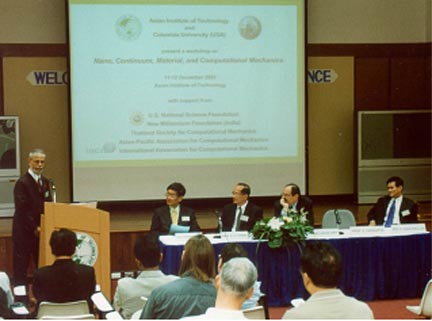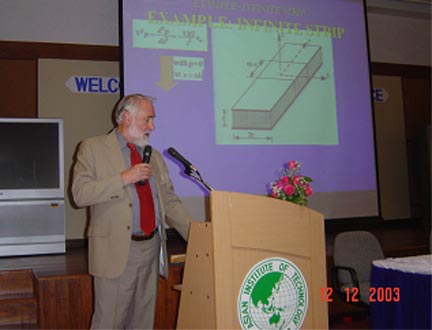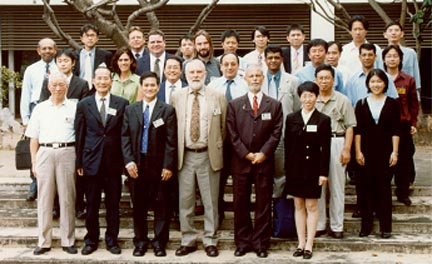
At the opening ceremony: Workshop Co-chairman Gautam Dasgupta with Director of Thailand's National Nanotechnology Center, T. Wiwut, NSF Team Leader Ken P. Chong, AIT President J. L. Armand and Workshop Co-chairman W. Kanok-Nukulchai.
AIT, Columbia University lead 'Pioneer Workshop' in Nanotechnology
A significant breakthrough - one of the many - in the experimental and modeling of nano-mechanics was the showcase highlight during a recent workshop on 'Nano, Material, Continuum and Computational Mechanics'.
The workshop, organized on December 11- 12, 2003 at AIT's Milton Bender Auditorium in collaboration with the Columbia University (CU), is under the sponsorship of US-based National Science Foundation (NSF) and conducted under the auspices of Thailand's National Nanotechnology Center, New Millennium Foundation (India), Thailand Society of Computational Mechanics, and the International Association of Computational Mechanics.
It is the first and apparently the 'pioneer workshop' in nanotechnology at AIT.

Professor James M. Kelly from the University of California (Berkeley) during his presentation.
The activity covered presentations on various subjects ranging from atomistic and nano-technological developments to the forefront and limitations of current methodologies.
The two-day event served as a platform for researchers from across several disciplines to share their experiences on the potentials of nanotechnology in designing new engineering materials.

Workshop delegates: engineers and scientists from across different regions
Among those who attended the workshop were renowned experts such as Gautam Dasgupta of CU, Alexander Wagner of North Dakota State University, from Kagawa University (Japan). Around 30 engineers and scientists from Asia and North America participated with key players from Thailand including SCE Dean Worsak Kanok-Nukulchai, Dr. William Barry, and Dr. Joydeep Dutta of AIT, Teerakiat Kerdchareon of Mahidol University, and Cattaleeya Pattamaprom of Thammasat University.
<
